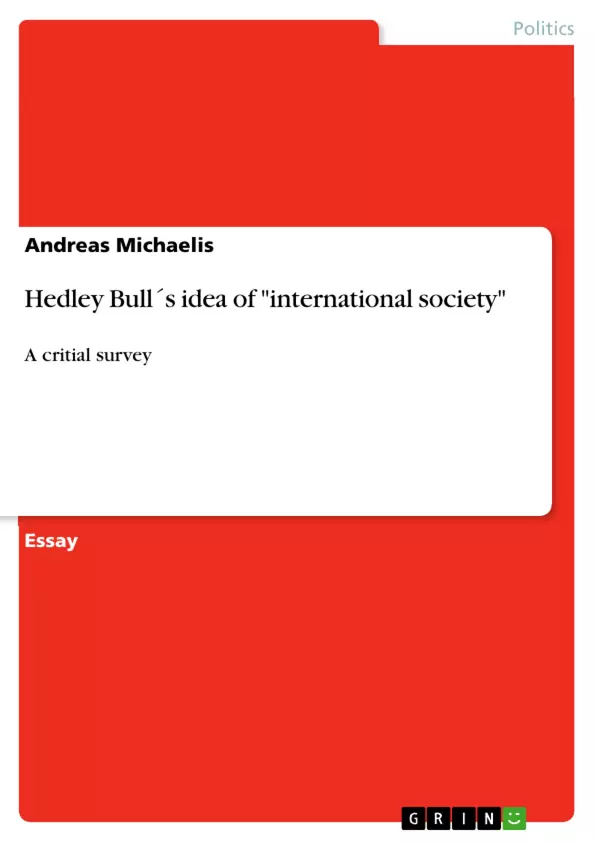This October, one major headline filled German newspapers. The American “National Security Agency” (NSA) were hacking the mobile of Bundeskanzler Merkel. The country was outraged. Nobody could understand why the Americans collect information, under the justification of “War against terror”, from a declared ally.
Do we not live in an international society where friends can trust each other and their acts are defined by morality? Is there maybe an un-spoken rule, that anticipates such behaviour or a conceived common set of beliefs, which appear when two states start an interaction?
In this essay I will assess critically Hedley Bull´s idea of “international society”, which could account for the spy attack by the USA against Germany. Firstly, I will explain the statements of the “English School”, which Hedley Bull assigns himself to. After this, I will distinguish it from other International-Relation (IR) theories like Realism and Liberalism. Furthermore I want to interpret the meaning of “international society”. I want to show how it is built up (historically), how it is ruled and how this approach solves the problem of anarchy. After that I am going to criticize the idea of the “international system”. In the end I will summarize and evaluate if this approach in international relations is valid or not. Before I start I have to give some background information.
The term “English School” was coined in the 1970s to describe a group of predominantly British, or British inspired, writers for whom “international society is the primary object of analysis(Linklater et al 2013,88). Hedley Bull, a former professor for IR in Oxford, was one of the most influential early members of the “English School”.
Inhaltsverzeichnis (Table of Contents)
- Introduction
- The main statements of the "English school"
- Realism
- Liberalism
- International society
- International System or "the system of states"
- International society
- Central categories
- Morality
- Norm
- Rights and Justice
- Conclusion
Zielsetzung und Themenschwerpunkte (Objectives and Key Themes)
This essay critically examines Hedley Bull's concept of "international society," aiming to analyze its applicability to the 2013 NSA spying scandal involving Germany. It explores the "English School" of International Relations (IR) and its relationship to Realism and Liberalism. The essay aims to understand the formation and operation of "international society" and assess its ability to address the issue of anarchy in international relations.
- The "English School" of IR and its distinct theoretical approach.
- The concept of "international society" and its defining features.
- The role of common interests and values in shaping international cooperation.
- The impact of power and the influence of historical systems on international society.
- The limitations and potential challenges of the "international society" concept.
Zusammenfassung der Kapitel (Chapter Summaries)
The introduction sets the scene by highlighting the NSA spying scandal and the question of whether an "international society" exists where states can trust each other. It outlines the essay's aim to critically assess Hedley Bull's concept of "international society."
Chapter II explores the core tenets of the "English School" of IR, emphasizing its "Via Media" position between Realism and Liberalism. It examines the realist perspective based on a Hobbesian view of anarchy and the contrasting liberal focus on internal state structures and individual actors. It highlights the "English School's" emphasis on the rationality of states and their ability to cooperate despite the absence of a central authority.
Chapter III delves into the concept of "international society," contrasting it with the "international system of states." It examines the historical evolution of international systems, tracing the development of specific regional systems and the gradual emergence of a more unified global order based on European principles of international law.
Chapter IV examines the central categories of "international society," including morality, norms, rights, and justice. It explores how states, despite operating in an anarchic environment, can still be bound by moral standards and cooperate through shared interests and values. The essay further examines the concept of anarchy and how it can be mitigated through the existence of common rules and institutions.
Schlüsselwörter (Keywords)
Key terms and concepts explored in this text include "international society," "English School," "Realism," "Liberalism," "anarchy," "international system," "common interests," "common values," "morality," "norms," "rights," "justice," "power," "historical systems," "regional systems," "international law," "state sovereignty," and "cooperation."
Frequently Asked Questions
What is Hedley Bull's concept of "international society"?
Hedley Bull defines "international society" as a group of states that, while living in an anarchic system without a central authority, are bound by a common set of rules and share common interests and values.
What is the "English School" of International Relations?
The "English School" is a theoretical approach that positions itself between Realism and Liberalism (the "Via Media"), focusing on the "international society" as the primary object of analysis.
How does the "English School" differ from Realism?
Unlike Realism, which views international relations as a Hobbesian state of war and pure power politics, the English School emphasizes the rationality of states and their ability to cooperate through shared norms.
What is the difference between an "international system" and an "international society"?
An international system exists when states have enough contact to impact each other's decisions, whereas an international society exists when those states also share common rules and institutions.
How does international society solve the problem of anarchy?
It solves anarchy not by creating a world government, but through the establishment of common rules, morality, and institutions that guide state behavior and foster order.
What central categories are examined in Bull's theory?
The central categories include morality, norms, rights, justice, and the historical evolution of state systems.
- Arbeit zitieren
- Andreas Michaelis (Autor:in), 2013, Hedley Bull´s idea of "international society", München, GRIN Verlag, https://www.grin.com/document/273553



